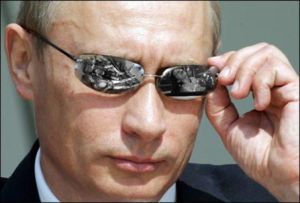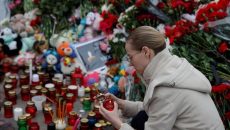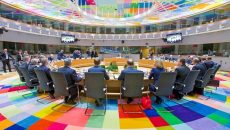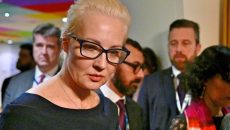Barking presidents don’t bite. No disrespect to Vladimir Putin, the man who has been defined as gray and could beat lots of records when it comes to longest term in office. But the grit he demonstrated during the bilateral summit between Russia and the European Union has the somewhat faded aroma of wine that’s been left in an uncorked bottle for too long. It seems like the lingering trace of an era that’s faded away, the one of full confrontation with the aggressive Bush administration, and not an approach that can guide Russia during a phase in which practically everyone has realized that we can get out of the global crisis only by working together, and not by bickering.
Making this attitude even more absurd is the everyday matter of the economy. The overall decline in growth (the World Bank having calculated that wealthy countries’ total GDP increased by only 1.6%, in 2011, compared to the 2.7% recorded in 2010) has brought down the prices of gas and oil, of which Russia is the world’s number one and number two exporter, respectively. With this, a sharp decline in revenues and a real blow to all the non-energy sectors that are fundamental to the Russian economy: construction, transportation, manufacturing. To keep the country afloat, so far the Kremlin has spent over 200 of the 600 billion dollars that, in 2008, it had in its stabilization fund, the world’s third richest, after those of Saudi Arabia and China.
Therefore, if Europe can’t produce without making use of Russian gas and oil, Russia can’t get by unless Europe grows, gets stronger
and becomes more prosperous.
Apart from the internally used rhetoric, the Kremlin is well aware of this. In fact, it invested 5 billion dollars to purchase the company that controlled Belarus’s gas pipelines. Having given the EU heads a talking-to, Putin set off for Beijing, again in the hopes of doing a good trade in gas exports (although the Chinese won’t budge on the price) and even more so in aerospace and military technology. On the eve of the Chinese talks, the Russian side emphasized the presumed Moscow-Beijing agreement regarding Syria, with obstinate support to Assad and to blocking any UN Security Council attempts to condemn or sanction him, reaffirmed to Barroso and Van Rompuy a few hours earlier.
But what exists between Russia and China is in no way an equal relationship. Business is booming (bilateral trade reached 84 billion dollars in 2011, more than 40% over 2010) yet Beijing’s strategies are often inscrutable and always unpredictable. The plans for the direct gas pipeline have been frozen for six years, and in the meantime China has made agreements with Uzbekistan and Turkmenistan. And if tomorrow Assad was no longer needed to put the U.S. on the spot, the Chinese leaders would drop him in the blink of an eye, like they did before with Gaddafi.
And so, paradoxically, Putin’s grit goes even further in highlighting the lack of an idea of a government that’s new, a bit more original than the usual trinity of Kremlin-oil-nation. The president who in the first decade of this millennium gave the Russians their longed-for stability is now struggling to satisfy the demands of the following generation: change, movement, discontinuity. For the time being, what’s saving him is the opposition’s lack of a clear political strategy.
But considering Putin’s age (barely 60), the length of his term (six years, renewable) and his unquestioned qualities as a Moscow insider and a man of power, Russia appears to have begun a long and somewhat depressing phase of conservatism. A zastoj (stagnation) which to some degree would bring to mind that of Brezhnev isn’t exactly what the Russians (or even the Europeans) were missing.
 Vladimir Putin.
Vladimir Putin. 


